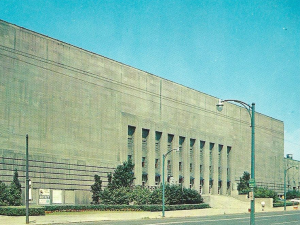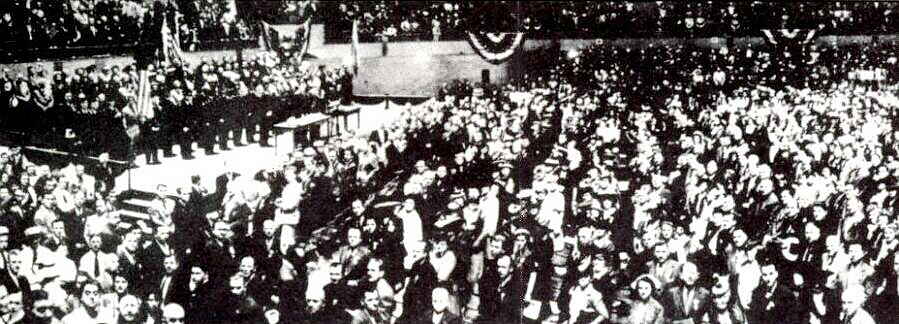The Memorial Auditorium was home to events of local, national, and international importance. For Buffalonians it’s where the Bisons brought home five national championships on the ice and the Braves took to the court. On the national level, it was a stop for Dwight D. Eisenhower and John F. Kennedy as they campaigned to be the next president of the United States. The Memorial Auditorium was the birthplace of the Polish American Congress, a national organization that would fight for Poland in the political arena.
 In late 1943, as the Second World War raged in Europe, a single national organization representing the wants of Polish America didn’t exist. Seeing this, the National Committee of Americans of Polish Descent began working with the Polish Falcons, the Polish National Alliance, and the Polish Roman Catholic Union of America, to hold a rally to better reflect the wants of Polish America. It was decided to hold the event at Buffalo’s Memorial Auditorium under the name, Polish American Congress with the mission, “hastening of victory, winning a just peace, bringing Poland and the United States closer together culturally and economically, and to work for the assurance of postwar Poland’s sovereignty.”
In late 1943, as the Second World War raged in Europe, a single national organization representing the wants of Polish America didn’t exist. Seeing this, the National Committee of Americans of Polish Descent began working with the Polish Falcons, the Polish National Alliance, and the Polish Roman Catholic Union of America, to hold a rally to better reflect the wants of Polish America. It was decided to hold the event at Buffalo’s Memorial Auditorium under the name, Polish American Congress with the mission, “hastening of victory, winning a just peace, bringing Poland and the United States closer together culturally and economically, and to work for the assurance of postwar Poland’s sovereignty.”
On May 28, pre-convention Masses were held at St. Stanislaus Roman Catholic Church and the Holy Mother of the Rosary Polish National Catholic Church with a noontime parade down Broadway to the Auditorium. At 3 o’clock sharp Charles Rozmarek, president of the Polish National Alliance, formally convened the congress.
The first day saw a flurry of speeches including Senator James M. Mead, Congressmen Joseph Monkiewicz, a message from President Franklin D. Roosevelt, and keynote speech by Mr. Rozmarek. The thrust of Rozmarek’s address was the fear that the U.S. would allow Poland to fall under the influence of communism after the war. If left unchecked, Poland could “live under an anti-democratic government with its abhorrent collectivism and with its one-party system run by a secret police force more efficient than the dreaded Gestapo” which would lead to “endless suffering instead of a free, democratic life of their own choice.”

These fears were reiterated on day two, but Dean Frank X. Swietlik of Marquette University was more hopeful. “When this war is ended, I feel certain that the old American tradition of liberty and justice for all will prevail and Poland will have a rebirth in a more glorious freedom.”
At the closing sessions, a letter to President Roosevelt was approved that asked him “not to permit the United States to be involved in designs against Poland and its future whether in the East or in the West” and to maintain Poland’s “territorial integrity.” Then by a standing vote the delegation agreed that the Polish American Congress should become a permanent organization and closed under the declaration, “[w]e firmly believe, as freedom loving Americans, that neither Poland nor any other lesser nation fighting for the common cause of democracy should be sacrificed to the intemperate greed of her more powerful neighbors—even if these neighbors happen to be our allies.”
Over the next 70 years, the Polish American Congress would continue to fight for a free Poland, spur a U.S. Congressional invitation into the Katyn Massacre and help Poland secure a seat at NATO. Today, the congress has been applying pressure to the Federal Government to approve Poland for the Visa Waiver program.
Do you have any stories or memories about this location of the Polonia Trail? We would love to hear it! Please send us your story, and if it is chosen, it will be added to the site.
Send Your Story